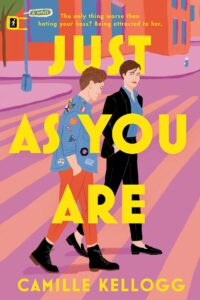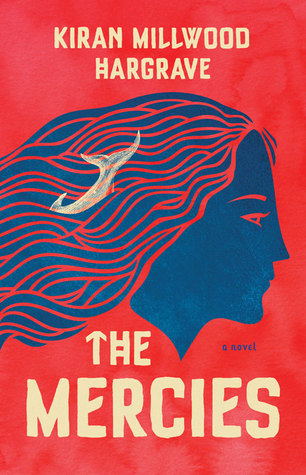In Camille Kellogg’s debut romance, Just As You Are, a workplace clash turns into a workplace crush.
Nether Fields, a long-running queer women’s online magazine, is on the verge of shutting down as Liz and her Nether Fields coworkers gather to mourn its passing. But when two wealthy lesbians swoop in to save the publication, these staff writers and close friends are given a second chance to uphold the magazine’s values. What Liz hasn’t told anyone is that she’s getting tired of being Nether Fields’ resident sex and relationship columnist, spending every day writing butt plug reviews and clickbait personality quizzes. She has bigger aspirations: to launch an independent writing career and publish her first novel.
But that dream gets squashed as Liz gets pulled back into the orbit of the Nether Fields culture, and into the thrall of one of its hot new owners, Daria. Daria militantly audits the magazine’s business practices, slashing budgets in an attempt to pull Nether Fields out of the red while alienating staff with her no-nonsense approach. Liz is equally repelled by and attracted to Daria’s intensity, unable to deny the allure of her confidence and androgynous fashion sense.
What starts as an antagonistic relationship (Daria basically calls Liz’s articles puerile fluff) slowly develops into something more nuanced. When the two share a car from New York to Boston for a work assignment, Liz starts to see beneath Daria’s business-like exterior. Daria provides a window into her strained relationship with her conservative, hard-to-please family. Liz confides in Daria about her writing dreams and her ongoing struggle to feel confident in her skin. It almost feels like they each accept the other person just as they are, as the book’s title suggests. But every time Daria seems to open up, she subsequently pulls away from Liz. Will their clashing personalities and workplace politics get in the way of a deeper connection?
What made this Pride and Prejudice inspired enemies-to-lovers story stand out to me was its exploration of Liz’s feelings about her gender and her struggle to express it authentically. Despite being immersed in accepting, queer work and home environments, Liz hasn’t quite hit her stride when it comes to presenting herself to the world, often choosing her wardrobe to conform to her environment on any given day. Typically our romantic heroines have already found their “look,” or fall into a certain bucket of queer identity, so it was refreshing to watch Liz navigate the moving target of her gender expression.
Like Austen, Kellogg explores class dynamics, in this case of a workplace being overhauled by wealthy benefactors. That said, Kellogg could have done more to explore the dynamics of the diverse cast of friends/coworkers that serve as the book’s vibrant backdrop. While Liz, who is white and cisgender, gets embroiled in a situationship with Daria, she simultaneously casts judgment on her coworker and roommate Jane, a Black trans woman, when Jane gets involved with the magazine’s other rich buyer, Bailey. Liz also teases Katie, another roommate and woman of color, for being hung up on an unrequited crush. There is an unacknowledged imbalance in the way Liz moves through the world that I would have preferred not go unchecked.
Read if:
- You like to lovingly poke fun at queer culture sometimes.
- You enjoyed The L Word: Generation Q in all its entangled millennial glory.
- You want to reflect on your gender identity and presentation.


